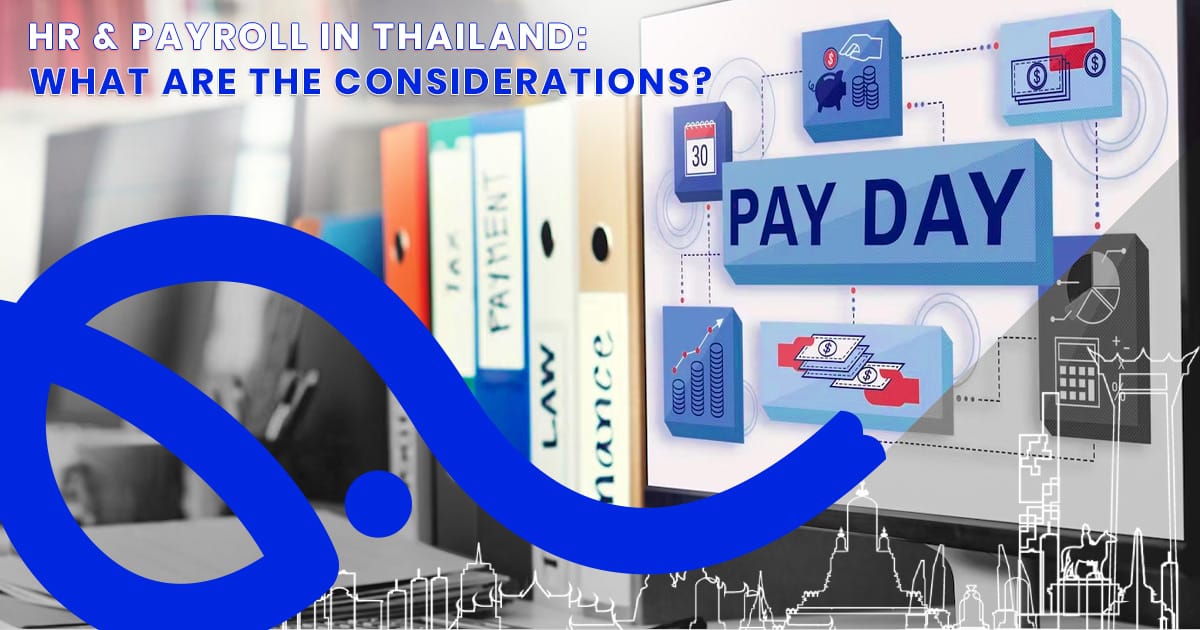Employees are a company’s most precious and critical asset, and handling payroll operations is critical to maintaining employee morale and well-being. It’s also critical to make sure they receive payment on time and satisfy all Thailand regulatory obligations. The consequences of not handling this appropriately can have a substantial impact on your company’s success.
With constantly changing taxation and income taxation legislation, managing staffing and payroll gets increasingly complex. This happens more as your firm grows and expands throughout Southeast Asia. Failure to file proper and timely returns, pay employees correctly, or maintain confidentiality can result in fines. More importantly, negative feelings among employees who are not paid correctly.
Thailand is a fantastic land for business opportunities in this area of the world, as it has the second-largest economy in Southeast Asia. The country has a wealth of natural resources, honest and productive people, and a strategic location. Suvarnabhumi International Airport (BKK) in Bangkok is easily accessible from airports all around the world, with direct flights available from London, Amsterdam, Hong Kong, and Dubai.
If you are planning to extend your company to Thailand, it’s critical that you understand and comply with Thai labour and payroll laws. The country has its own policies covering, among other things, sick pay, overtime rates, taxation, and pensions.
Tax Considerations
Personal Income Tax
The income tax of a Thai employee is on the basis of the amount of their salary. Anyone earning less than 150,000 baht ($4,930) per year is exempt. Henceforth, the tax rate increases to 5%. Thai tax rates steadily rise to a high of 35 per cent for those earning more than 5,000,001 baht ($164,348) per year.
When employees’ salaries are under a Pay As You Earn (PAYE) system, tax is generally withheld. This eliminates the need for employees to file annual tax forms, but it does require businesses to file a Monthly Withholding Tax form. Manual forms submission is a must by the 7th of the following month, while online forms submission is within the 15th. Employers should also contribute to a workplace pension system for their employees, and Social Security rates are 5%.
Anyone living in Thailand for more than 180 days is a Thai resident for tax reasons. Residents must pay taxes on all of their earnings, whether they originate from Thailand or elsewhere. Those working in Thailand for less than 180 days only have to pay tax on income on their earnings within the country. Regardless of whether you have a work permit or not, you must pay tax.
Corporate Income Tax
Thailand has Double Tax Treaties with the majority of other nations in the globe. These agreements intend to prevent taxation on a company’s income twice (in more than one country).
Thai enterprises that earn local and/or foreign money, as well as international corporations that earn income in Thailand, are subject to a 20% corporate tax. Unless the corporation has a paid-in capital or total yearly income of fewer than 3,000,000 baht ($98,586), this is the situation. Anything below this is taxed at 15% unless the paid-in capital or total income is less than 300,001 baht ($9859), in which case the corporation is tax-free.
Thailand collects corporate income tax twice a year. A tax return is compulsory within two months of the conclusion of the first half of the tax year. The second tax return is a must within 150 days of the financial year’s end date.
HR Considerations
Regular Working Hours in Thailand
The majority of Thai workers have to work Monday through Saturday. Monday through Friday, the hours are normally 8.30 a.m. to 5.30 p.m., with a one-hour lunch break. There is a half-day on Saturdays. The maximum number of hours of work each week is 48.
Vacation, Maternity and Sickness
Employees in Thailand are eligible for six days of yearly leave each year. These are usually single individual days throughout the year rather than as a block of time. Furthermore, the country has 13 national holidays during which employees should not work.
Pregnant women are eligible for 45 days of paid maternity leave, plus an extra 45 days of unpaid leave. Thailand allows 30 days of legal sick leave each year, which is a significant allowance. Additionally, employees can get compensated time off for personal reasons, such as caring for sick family members.
Termination
Although there is an agreement between employers and employees of certain obligations, most companies in Thailand do not provide a written contract. When an employee leaves, either party must provide the other 30 days’ notice.
If an employee is fired, they are entitled to severance pay unless there has been gross misconduct or criminal activity. This should be at least one month’s pay, depending on their term of service.
The Bottomline
There are many more things that you have to consider while deciding the HR and Payroll structure for your company in Thailand. It can be more difficult if you are a foreigner. The HR and Payroll structure of any organization is greatly in sync with the constitutional and labour laws of a nation. Therefore, as a foreigner doing business in Thailand, you must hire a professional Payroll Management Consultant.
From a professional Payroll Service provider like Konrad Legal, expect the following services:
- Payroll calculations
- Report distribution
- Pay-slip creation
- Banking of employee net salary
- Withholding tax (PND 1)
- Social Security (SPS 1-10)
- Withholding Tax Certificate (BIS 50)
- Provident Fund
- Workman’s Compensation
- Payments to government agencies
- Electronic reporting
For assistance, mail us at officer@konradlegal.com.



